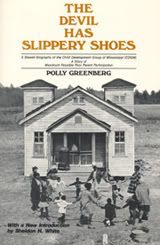
Last week we had the document with Charles Evers vowing to do all he could to stop the Jackson Head Start program. I haven't found anything that 100% confirms that part of the document but I found plenty in Polly Greenburg's book , "The Devil Has Slippery Shoes", that seemed to confirm other sections of the document. It all gives me the impression that in 1966 there was a strong push by some black leaders to force whites out of the Civil Rights movement. I wonder if and how things would be different today and this push had never been made? Here are some quotes from Ms. Greenburg's book:
From page 505, in regards to the out-of-state white students coming to work for CDGM for the summer: "Alas, as I soon learned, FDP's (Freedom Democratic Party) CDGM informants had given FDP to believe that in-state students would be hired over my dead body--that I was trying to "sneak in" exclusively out-of-staters. My purpose? To "take jobs" from poor people because in my lofty, aristocratic manner, I considered them incompetent! I soon became more the enemy than ever."
From page 546, I don't think the white out-of-state student volunteers were quite prepared for this part of the CDGM orientation program: "After lunch ATG Lavaree Jones discussed her own experiences teaching with CDGM, and the goals of CDGM's Head Start program. Don Jackson of the CDGM social service department, and Bob Fletcher, both of whom were Negroes with many years experience with the problems of whites in the civil rights movement, read and discussed the "Atlanta Position Paper on the Role of Whites in Organizing in the Black Community." The paper deals with whether whites can contribute anything but a reinforcement of dependency habits now, in the new Negro struggle for autonomy. Marilyn felt that it was only fair to expose the summer students as soon as possible to a sensitive and through explanation of the roots of Negro ambivalence and the controversy regarding whites in the Negro community resulting from it."
From page 549, the new role of whites in the Civil Right's movement: "The third vital function of whites in CDGM was becoming clear during this struggle-for-autonomy period in CDGM's quick growth. We had served our purpose, or nearly so, as originators, organizers, catalysts, connections to the outer world, etc. We had served our role as trainers. We could no longer be useful in a training capacity as staff members, because prominent CDGM Negroes could no more accept white-originated programs than they could white people--a healthy sign.
Our skills were still needed, but in the less controlling and threatening role of consultants. But our third vital function was just now being fully realized and utilized. We were unconsciously serving as spears and spurs to the motivation of "the apathetic poor." Middle and top level Negroes, who had previously been unable to move themselves to deep involvement in top decisions, were, through angry feelings of competitiveness with us, suddenly feeling hot enough to leap up and act--against, maybe, but act! They often leaped before they looked, but at last, they leaped! We were very useful, if not happy, as the mock enemy with which Negroes with potential high-level leadership capacities could practice fighting white power with appropriate white man's techniques....."
And finally, a brief section from the foreword of the book which may have been a comment directed to Charles Evers: I heard you, Charles, and I learned a great deal from what you said. You told me, "Some of us love you, and many of us know what you have done for us, and most of us agree with your ideas. But you have got to learn, we can't let love and appreciation get in the way of us doing for us, and us having ideas. It's not that we're against you. It's that we've got to do this thing for ourselves. It's the only way we'll ever feel our freedom."
---------------------------------------------------------------------------------
I wanted to make a brief comment about all of the above. I do understand the part from the foreward about people needing to do things on their own. I believe that would be an honest reaction after the years of Jim Crow in the South, but there seems to be something inherently wrong with a plan that has to be implemented by slandering people who have taken great risks on your behalf. There also seems to be something wrong when history doesn't reflect the fact that people who were trying to make amends for the past were told to stop helping. But history is never completely about the truth, it's about which side can control the version of the story that eventually gets told.
No comments:
Post a Comment